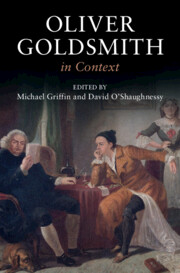Book contents
- Oliver Goldsmith in Context
- Oliver Goldsmith in Context
- Copyright page
- Dedication
- Contents
- Illustrations
- Notes on Contributors
- Preface
- Chronology
- Abbreviations
- Part I Life and Career
- Part II Social, Cultural, and Intellectual Contexts
- Chapter 5 Enlightenments
- Chapter 6 Universities
- Chapter 7 Libraries
- Chapter 8 The Club
- Chapter 9 Irish London
- Chapter 10 Liberty
- Chapter 11 Cosmopolitanism
- Chapter 12 Marriage
- Chapter 13 Gender
- Chapter 14 Race
- Chapter 15 Religion
- Chapter 16 Natural History and Science
- Chapter 17 War and Empire
- Chapter 18 Ghosts
- Part III Literary Contexts
- Part IV Critical Fortunes and Afterlives
- Further Reading
- Index
Chapter 8 - The Club
from Part II - Social, Cultural, and Intellectual Contexts
Published online by Cambridge University Press: 28 November 2024
- Oliver Goldsmith in Context
- Oliver Goldsmith in Context
- Copyright page
- Dedication
- Contents
- Illustrations
- Notes on Contributors
- Preface
- Chronology
- Abbreviations
- Part I Life and Career
- Part II Social, Cultural, and Intellectual Contexts
- Chapter 5 Enlightenments
- Chapter 6 Universities
- Chapter 7 Libraries
- Chapter 8 The Club
- Chapter 9 Irish London
- Chapter 10 Liberty
- Chapter 11 Cosmopolitanism
- Chapter 12 Marriage
- Chapter 13 Gender
- Chapter 14 Race
- Chapter 15 Religion
- Chapter 16 Natural History and Science
- Chapter 17 War and Empire
- Chapter 18 Ghosts
- Part III Literary Contexts
- Part IV Critical Fortunes and Afterlives
- Further Reading
- Index
Summary
The Literary Club, often simply known as ‘The Club’, was founded by Samuel Johnson and Joshua Reynolds in 1764. The Club has been understood as the epitome of a strain of Enlightenment clubbability, modelled on earlier eighteenth-century ideals of conversation and channelling them into a new form of argument-as-sport. However, Goldsmith’s experiences of being often ridiculed at meetings can help counterbalance heroic accounts of the club by foregrounding a tendency to cruelty in this celebrated institution. This chapter provides a more balanced account of the Club than we are used to, one that insists on Goldsmith’s centrality to its activities, not only as a founding member and successful product of its cultural networking, but also as a figure who exposes the dual nature of the Club.
- Type
- Chapter
- Information
- Oliver Goldsmith in Context , pp. 64 - 71Publisher: Cambridge University PressPrint publication year: 2024

